The Tyne Tunnel has marked a full year since its controversial switch to cashless toll payments.
It has been 12 months since the crossing’s old toll booths and barriers were ditched, in an effort to speed up journey times and reduce pollution levels. While transport bosses insist that the huge change has achieved its goals, it has been far from plain sailing for the new ‘ Tyne Pass ’ system.
Earlier this year it was branded an “absolute disaster” – with complaints about the new toll payment methods, “threatening” enforcement notices, and fines being wrongly issued to people living hundreds of miles away. However, figures revealed on the scheme’s first anniversary on Tuesday confirmed that the percentage of drivers successfully paying their toll by the deadline of midnight on the day after their journey has reached a new high.
Read More: Fears that 'essential' fire services in Tyne and Wear face cuts amid 'huge' budget strain
Tunnels operator TT2 said that 3.11% of motorists were issued with a fine for not paying their toll in October, down from 5.39% in its first month. But, with more than 1.5m vehicles crossing the river each month, this still means that tens of thousands of penalty notices are being issued – generating more than £13.5m in income for TT2 since November 2021.
Philip Smith, chief executive of TT2, said: “I am incredibly proud of how far we have come in the year since we introduced such a significant, historic change at the tunnels. Our main objectives of delivering faster, smoother journeys, reduced emissions and better local air quality have been met and we continue to listen to customers and analyse data and feedback to make sure we continuously improve our processes and the customer experience.”

Almost 17.5m journeys have been made through the tunnels since the switch to the cashless model and TT2 says that trips are more than 40 seconds faster than when the toll barriers were in place, also claiming to have cut CO2 emissions around the crossing by more than 90%. Under the free flow system, drivers now have to pay their toll either online, with a pre-paid account, over the phone, or in shops with PayPoint counters.
Critics of the changes have called for smaller fines to be issued for people who do not pay on time – rather than the current £60 penalty, reduced to £30 if paid within 14 days or increased to £100 if not settled within 28. More than 20,000 people have signed an online petition calling for unpaid toll charges to be cancelled and for a "more ethical and affordable" system to replace the existing penalties.
A review conducted by Transport North East (TNE), which manages tunnel operator TT2’s contract on behalf of the North East Joint Transport Committee, admitted in September that some aspects of the Tyne Pass “would have been done differently if the system was planned again” – but said that criticism of it had been “disproportionate”.
The cost of the toll itself is due to increase in 2023 by 30p for car drivers and 50p for HGVs. Regional transport chiefs said the change was needed because of rising inflation levels, but had suggested that the increase be pushed back from February next year to May in order to avoid putting struggling residents under further financial strain over the winter.
Councillors are now due to vote on the proposal next week, after a previous meeting scheduled for November 3 had to be postponed.
Read More:
- Council backs new 'world class' RVI children's heart unit – but health chiefs await final approval
- Calls to save 'dying' Gosforth High Street as council pledges talks with locals over bollard removal
- Demolition crews begin tearing down another Newcastle city centre building to make way for £155m HMRC offices
- Asylum seeker slams 'miserable' life in Newcastle hotel which he claims is 'worse than prison'
- Major revamp of Northumberland Street with new 50ft lighting pillars put on hold until 2023







